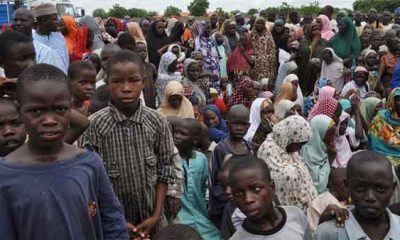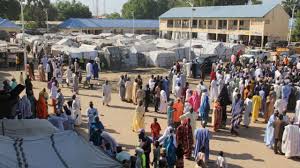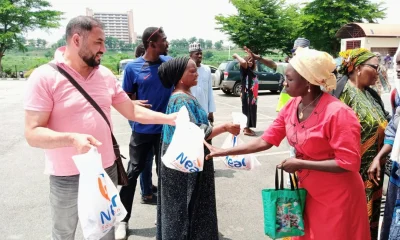NEWS
FG, NASS to Improve IDPs’ Plight

By Orkula Shaagee, Abuja
The Executive and the legislative arms of government are working to ensure the improved living condition of Internally Displaced Persons (IDPs) in the country.
Speaker of the House of Representatives Rt.
Hon. Femi Gbajabiamila, who disclosed this on recently during a visit to Maiduguri to assess the conditions of the IDPs, said the Federal Government was more than committed to ensure that all IDPs were reunited with their families.Gbajabiamila said as the Speaker of the House, President Muhammadu Buhari was aware of his visit to Maiduguri and that as a government, they would work together to see an end to the issue.
“If you see me if you see the House, then you see the President of the Federal Republic of Nigeria. I want you to take it away. I stand here as the Speaker of the House, but we’re one government. The president is aware that I’m here. We’re one government, and we speak with one voice. Whatever is comes under my voice, is coming from Mr. President.
“We will work together as one government. We have come with principal officers of the House. That tells you the importance that we attach to this assignment, including the Minority Leader and opposition leader of the House, Ndudi Elumelu, is here. That tells you that the issue of IDPs, the issue of terrorism is not an APC thing, it is a joint task between all parties, and Insha Allah (by the grace of God) this will become a thing of the past.
“To all the internally displaced persons, all I can say to you is to keep hope alive, that government is here to support you, the government will do whatever it needs to do to make sure that whatever you’re going through now in a very not-too-distant future will be a thing of the past,” he said.
“We have brought our little token of support, which is two trucks of rice, that is 1,200 bags of rice,” the Speaker said, adding that “It’s not even near enough, but they say little drops of water makes an ocean.”
“We will continue to provide whatever we can provide to support you, most importantly, legislation. I want to thank you again for receiving us,” Gbajabiamila added.
The Speaker, who expressed displeasure over the condition at the IDPs’ camp, said: “Hajj camps and even refugee camps are meant to be a stop-gap measure, not a permanent sight as it may fast be approaching here.
“It is our responsibility as a government to make sure that the almost 32,000 that inhabit this camp are gradually reduced and resettled back to their families and their homes in a not-too-distant future. We are here to give encouragement on the little succour we can as government and to see what we can do using the instrumentality of the law to address issues that concern internally displaced persons.
“I believe that not just before the eyes of God, but even in law all men are created equal, and there is equality before the law. The way we will treat ourselves, our families, our friends and those in our homes is the same way we should treat those who by misfortune or fate or by the situation of their lives find themselves internally displaced. The internally displaced should not and must not at any point in any country become a permanent part of our lexicon.
“It is important that we know the condition under which these young children, mothers, and fathers are living. It is important that we know whether the ministry of education has a role to play here, whether their education is suffering, what is the ratio of teacher to students here if there are any?
“If that does not meet required standards in any developing or developed nation, then as a National Assembly, and as a government, we must deal with that situation.
“It doesn’t take a rocket scientist to know that there is a direct nexus between education and what’s going on in Borno State today. God forbid, while we seek to settle people in camps, who are otherwise victims of Boko Haram, they, because of the condition and the lack of education, end up becoming exactly what we’re trying to avoid them from becoming.
“That’s why we’re here today to make sure that all is well. All can never be well if anybody is living in a camp; to make sure that as best as possible, the government plays its role in making sure the welfare of those who are in camps is taken care of. Constitutionally, the primary purpose of government is the security and welfare of its people. These are our people, and we must make sure that they’re well taken care of.”
In his remark, Borno State Governor Prof Babagana Umara Zulum thanked the Speaker for the visit and the magnanimity shown in donating the rice to the IDPs.
“I wish to express my profound appreciation to the Speaker and his entourage for the contribution they have made to the people of Borno State and indeed to the displaced communities of Borno State. What matters is not the quantum of what you have donated but the spirit behind it.
“We will remain eternally grateful to you. As I have told you this morning, the demands of our people are 1: security, 2: reconstruction and resettlement so that they can go back home and start means of livelihood. On this note, once again, we remain eternally grateful to you,” Zulum said.
NEWS
Tinubu Approves Management Unit for Health Sector Renewal Investment Initiative
President Bola Tinubu has approved the establishment of the Sector-wide Coordinating Office-Programme Management Unit (SCO-PMU) domiciled in the Office of the Coordinating Minister of Health and Social Welfare.A statement on Friday by his spokesman, Chief Ajuri Ngelale, said the unit would ensure efficient, transparent and accountable management of external grants mobilised towards the implementation of the Nigeria Health Sector Renewal Investment Initiative (NHSRII).
Ngelale said SCO-PMU would report to a Steering Committee/Ministerial Oversight Committee chaired by the Minister, including the Minister of State, Permanent Secretary; Ministry of Finance, Ministry of Budget and Economic Planning and relevant development partners. “The SCO-PMU will serve as the secretariat and delivery unit for the NHSRII and is to be headed by a national coordinator (NC).“The functions of the SCO-PMU include programme management, monitoring and evaluation, engagement and supervision of Independent Verification Agents (IVAs) for NHSRII programmes and fiduciary management, among others.“Consequently, the President has approved the appointment of Dr. Muntaqa Umar Sadiq as the National Coordinator of SCO-PMU,” he said.Report says that Sadiq has over 17 years of experience in public health, impact investing, investment banking, energy, and climate financing across the health, finance, climate and energy sectors.He had served as Head of the Performance Management and Delivery Unit at the Federal Ministry of Health and Social Welfare and Chief Executive Officer of the Private Sector Health Alliance of Nigeria.He also served as Head of the Nigeria Energy Transition Office and Private Sector Engagement Adviser at the World Bank. (NAN)
Education
FG Denies Slash in Students’ Allowances

The Federal Government says it has no plan to slash scholarship students’ allowances as recently projected in the media.The Minister of Education, Prof. Tahir Mamman, stated this during a meeting with the leadership of the National Association of Nigerian Students (NANS) in Abuja on Friday.
Report says that there was a report that the ministry, through the Federal Scholarship Board, announced a slash in allowances of foreign scholars stranded in Russia, Morocco, and Algeria among others.
The slash in scholars’ allowances under the federal government’s Bilateral Educational Agreement Scholarship (BEA) was attributed to the economic crises.Mamman said that there was no slash in scholars` allowances but rather an adjustment due to Foreign Exchange fluctuations (FOREX).“We want to clarify what has been in the media on allowances paid to scholars under the Bilateral Scholarship Agreement.“We want to place it on record that the ministry and the Federal Government for that matter have not slashed the allowances due to students.“What happened is some adjustments in the amount due to them because of FOREX fluctuations, and as soon as we get the balance we have applied for, we will pay them.“But for now, what is in the budget is what we can pay. So, there is no slash, we will even be happy to increase, so this is what has led to the adjustments,” he said.(NAN)NEWS
Planned Protests: CAN calls for calm and patience

By Laide Akinboade, Abuja
The Christian Association of Nigeria, CAN, on Friday, has urged Nigerians to calm and patient with Federal Government and should give the the government more time to address these pressing concerns.In a statement issued by CAN and signed by Archbishop Daniel Okoh ,President, CAN and made available to journalists in Abuja.
CAN also urged all Nigerians to consider alternative means of expressing their grievances. He however said CAN stands in solidarity with the citizens of nation during these challenging times of economic hardship and pervasive hunger. The statement reads in part, “As we navigate this period of crisis, it is imperative to uphold the constitutional rights of every Nigerian to peacefully protest and express their grievances. The right to assemble and voice discontent is a cornerstone of our democracy and must be protected and respected by all. Peaceful protests are a powerful tool for civic engagement, allowing the populace to communicate their concerns and hold leaders accountable. However, the anxiety related to the impending protests is heightening, especially given the volatile experiences in countries like Kenya and Pakistan.”We must also draw from our recent history. The #ENDSARS and #RevolutionNow protests, though rooted in genuine grievances, were marred by tragic incidents where miscreants hijacked the process. This led to widespread looting, destruction of properties, and unfortunate loss of lives. These experiences have shown us that mass demonstrations can quickly degenerate into chaos if not properly managed and coordinated.” In light of the planned protests scheduled to commence on 1st of August, CAN urges all Nigerians to consider alternative means of expressing their grievances. We recommend giving the government more time to address these pressing concerns. This period should be used to explore other legal avenues that will not easily give hoodlums the opportunity to hijack the exercise to destroy our national assets or endanger lives and properties. Dialogue, petitions, and town hall meetings are viable options that can yield positive results without the risk of disorder.”We call on the government to cut the cost of governance and expedite its efforts to alleviate the hardships in the land. The opulent lifestyle of political office holders must be addressed to demonstrate the sincerity of those in government to improve the living conditions of the people. Likewise, it is imperative that the government implements the newly approved national minimum wage to provide immediate relief to struggling families.”Furthermore, specific measures must be taken to put an end to kidnappings, banditry, and mass killings that have plagued various parts of our country. The security and well-being of every Nigerian should be paramount, and urgent action is required to restore peace and order.”We also call on the government to expedite its efforts to alleviate the hardships in the land. There is an urgent need for more refined and effective policies that address the root causes of the economic challenges we face. The government must deepen its consultations with stakeholders, including religious leaders, to create a more inclusive and comprehensive approach to problem-solving. By working together, we can devise sustainable solutions that reflect the needs and aspirations of the people.”In these trying times, let us all remember the words of our Lord Jesus Christ: “Blessed are the peacemakers, for they shall be called the children of God” (Matthew 5:9). As we seek to bring about positive change, let us do so with a spirit of peace, love, and unity. Our strength lies in our ability to come together, support one another, and work collectively toward a better Nigeria.”We pray for wisdom and discernment for our leaders, resilience and hope for our citizens, and divine intervention to guide us through these difficult times”.























